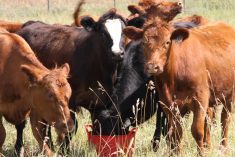Quarantine has been lifted on two British Columbia farms after their animals tested negative for brucellosis.The Canadian Food Inspection Agency placed the two farms under quarantine in May after three beef cows reacted positively to a brucellosis test during a routine check at an American slaughter plant.Samples from the original animals were retested at a Canadian laboratory using specific tests for brucellosis. The tests found that the first tests were wrong and likely caused by another bacterium known to create false-positive test results.After the suspect cases were discovered, the United States Department of Agriculture placed temporary import restrictions on cattle and bison to the United States from B.C.All sexually intact cattle and bison that have lived in B.C. since March 25, 2010, must test negative for brucellosis before being exported to the U.S.The positive brucellosis results shocked the cattle industry because Canada was declared brucellosis free in 1985. During the 1950s and 1960s, federal veterinarians tested cattle for the disease and euthanized positive animals.Brucellosis can cause undulant fever in humans, but is rare in Canada. Avoiding unpasteurized dairy products and careful handling of infected animals and their tissues can prevent human infection.Krista Howard, an epidemiologist and scientific adviser with CFIA, said it’s not uncommon to get false positives.”That’s just the nature of the test,” said Howard.”If you test a large volume of samples, you are going to get some false positives,” she said.CFIA has shared the results of its farm and laboratory tests with its American counterparts and is hoping the restrictions on B.C. cattle and bison moving into the United States will be lifted shortly.
Read Also

The Western Producer Livestock Report – November 6, 2025
Western Producer Livestock Report for November 6, 2025. See U.S. & Canadian hog prices, Canadian bison & lamb market data and sales insights.














